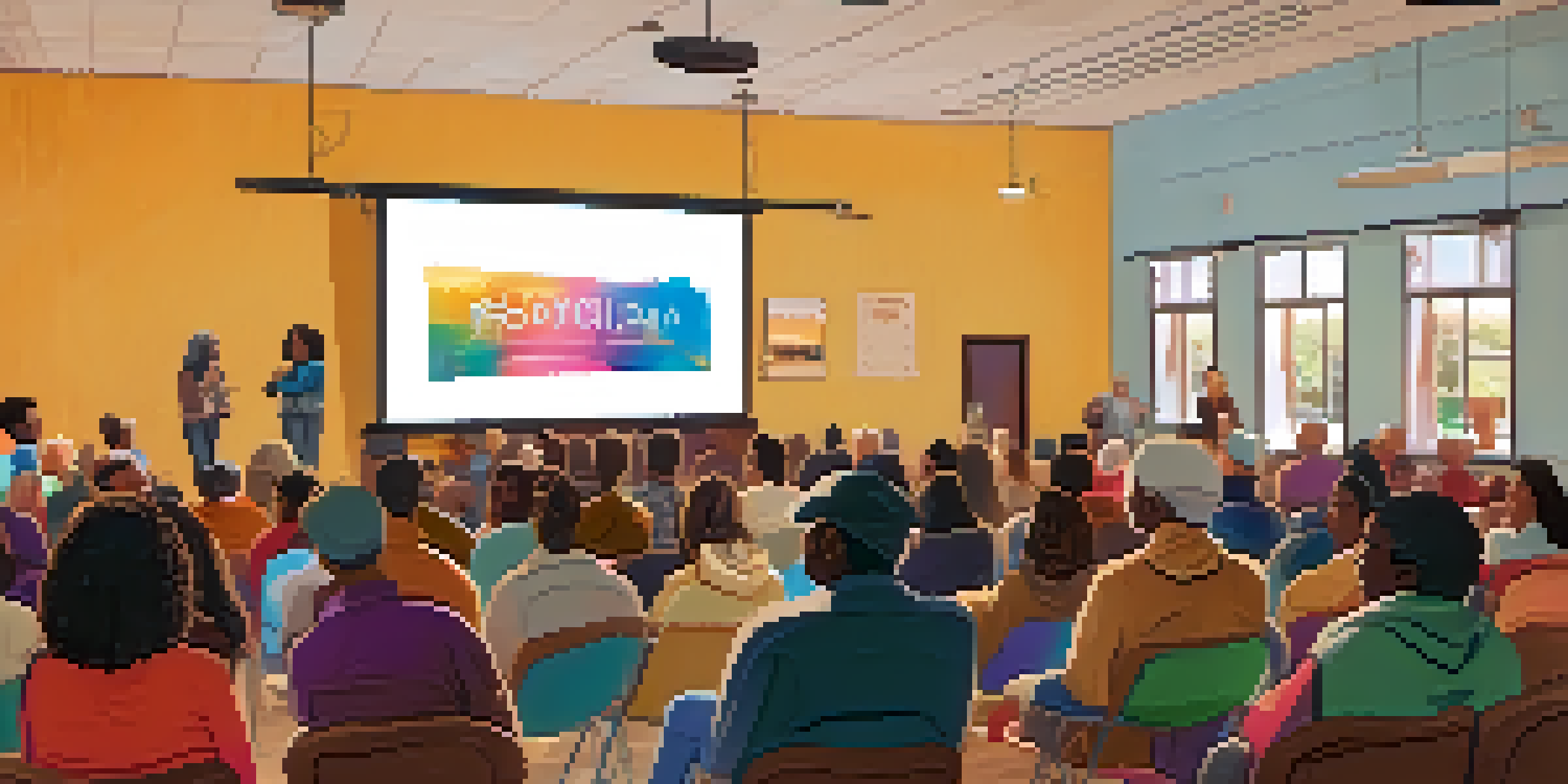The Role of Documentaries in Shaping Political Views

Understanding the Power of Documentaries in Politics
Documentaries have a unique ability to present complex issues in an engaging format. They combine storytelling with factual information, making them a powerful tool for shaping public opinion. By presenting real-life scenarios, they can evoke emotions and prompt viewers to consider different perspectives on political matters.
Documentaries are a powerful medium for conveying complex social issues, often providing insights that challenge our perceptions and inspire change.
These films often spotlight underrepresented voices, providing a platform for marginalized communities. This exposure can challenge viewers’ preconceived notions and encourage them to rethink their political beliefs. Essentially, documentaries can serve as a catalyst for social change by informing and inspiring action.
Moreover, the rise of digital streaming platforms has made documentaries more accessible than ever. With just a few clicks, viewers can dive deep into topics that matter to them, leading to a more politically informed public. This accessibility amplifies the potential impact of documentaries on shaping political views.
Documentaries as Tools for Advocacy and Activism
Many documentaries are created with a specific agenda in mind, aiming to advocate for social or political change. Filmmakers often utilize their work to highlight injustices, mobilize audiences, and inspire activism. For example, '13th' by Ava DuVernay sheds light on systemic racism and the prison industrial complex, urging viewers to engage in discussions about criminal justice reform.

These films not only inform but also empower viewers to take action, whether it's through voting, participating in protests, or supporting relevant organizations. By framing issues in relatable narratives, documentaries can motivate viewers to become active participants in the political landscape.
Documentaries Drive Political Change
By combining storytelling with factual information, documentaries can evoke emotions and inspire viewers to engage with important political issues.
The emotional weight of compelling storytelling makes these films memorable, often leading to sustained engagement with the issues presented. This means that documentaries can have a lasting impact beyond just the initial viewing, as audiences continue to discuss and reflect on the topics raised.
The Emotional Connection: Why Documentaries Resonate
One of the key reasons documentaries resonate with audiences is their emotional appeal. Unlike traditional news reports, which can sometimes feel detached, documentaries invite viewers into the lives and struggles of real people. This emotional connection fosters empathy, prompting viewers to consider the broader implications of political issues.
The power of documentary is that it can illuminate the human experience, offering a window into the lives of others and fostering empathy and understanding.
For instance, a documentary that follows a family's journey through immigration can humanize an often politicized topic. By sharing personal stories, these films encourage viewers to see beyond statistics and policies, allowing them to engage with the human side of political discourse.
This emotional investment can lead to a deeper understanding of complex issues, making viewers more receptive to new ideas and perspectives. As a result, documentaries can play a crucial role in shifting public attitudes and influencing political views.
The Role of Filmmakers in Shaping Narratives
Filmmakers hold significant power in shaping how political topics are presented and perceived. Their choices regarding which stories to tell and how to frame them can heavily influence viewers' understanding of an issue. This responsibility requires a careful balance between storytelling and accuracy, as bias can easily skew perspectives.
Documentaries often reflect the filmmaker's viewpoints, which can lead to a specific narrative being pushed. While this can be beneficial in raising awareness about critical issues, it can also create echo chambers if viewers only consume content that aligns with their beliefs. Therefore, it's essential for audiences to approach documentaries with a critical eye.
Emotional Connection Fosters Empathy
The personal stories presented in documentaries allow viewers to connect emotionally, leading to a deeper understanding of complex political topics.
By recognizing the filmmaker's intent and potential biases, viewers can engage more thoughtfully with the content. This awareness encourages a more nuanced understanding of political issues, fostering healthy debate and discussion rather than simple acceptance of a single narrative.
The Influence of Social Media on Documentary Reach
Social media platforms have transformed how documentaries are shared and consumed. With the ability to spread content rapidly, filmmakers can reach wider audiences than ever before. This newfound accessibility allows important political messages to circulate quickly, often prompting immediate discussions and reactions.
Platforms like Twitter and Instagram can help amplify the voices featured in documentaries, creating a community around shared interests and concerns. For example, hashtags related to a specific documentary can unite individuals passionate about the same cause, fostering a sense of collective action.
However, this also means that misinformation can spread just as quickly. Audiences need to critically evaluate the documentaries they encounter on social media, ensuring they engage with credible sources. By doing so, viewers can harness the power of social media to enhance their understanding of political issues without being misled.
The Potential Pitfalls of Documentary Influence
While documentaries have the power to inform and inspire, they also come with potential pitfalls. One major concern is the risk of oversimplification; complex political issues may be reduced to digestible narratives that fail to capture their intricacies. This can lead to misconceptions and a skewed understanding of the actual realities behind the topics.
Additionally, documentaries may inadvertently promote confirmation bias, where viewers seek out films that reinforce their existing beliefs. This can create echo chambers, limiting exposure to diverse perspectives. It's crucial for audiences to actively seek out a variety of viewpoints and engage with content that challenges their assumptions.
Filmmakers Shape Political Narratives
The choices filmmakers make in framing their stories can significantly influence public perception and understanding of political issues.
Ultimately, while documentaries can provoke thought and discussion, they should be viewed as part of a broader dialogue on political issues. Engaging with multiple sources and perspectives will lead to a more well-rounded understanding and informed political views.
The Future of Documentaries in Political Discourse
As we look to the future, the role of documentaries in shaping political views is likely to evolve. With advancements in technology and changing viewer habits, filmmakers will need to adapt their storytelling methods to stay relevant. Virtual reality and interactive documentaries may offer new ways to engage audiences and immerse them in political narratives.
Moreover, as global issues become increasingly interconnected, documentaries will continue to highlight the importance of understanding diverse perspectives. They can serve as bridges across cultures, fostering empathy and encouraging collaboration on pressing political matters.

In this rapidly changing media landscape, the potential for documentaries to influence political views remains strong. By embracing innovation and prioritizing authentic storytelling, filmmakers can ensure their work continues to spark meaningful conversations and inspire action.